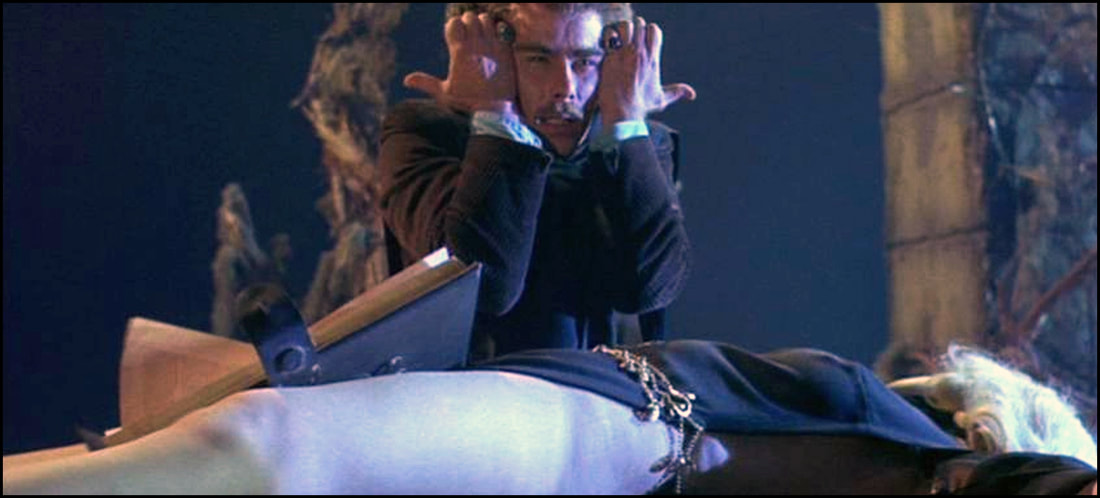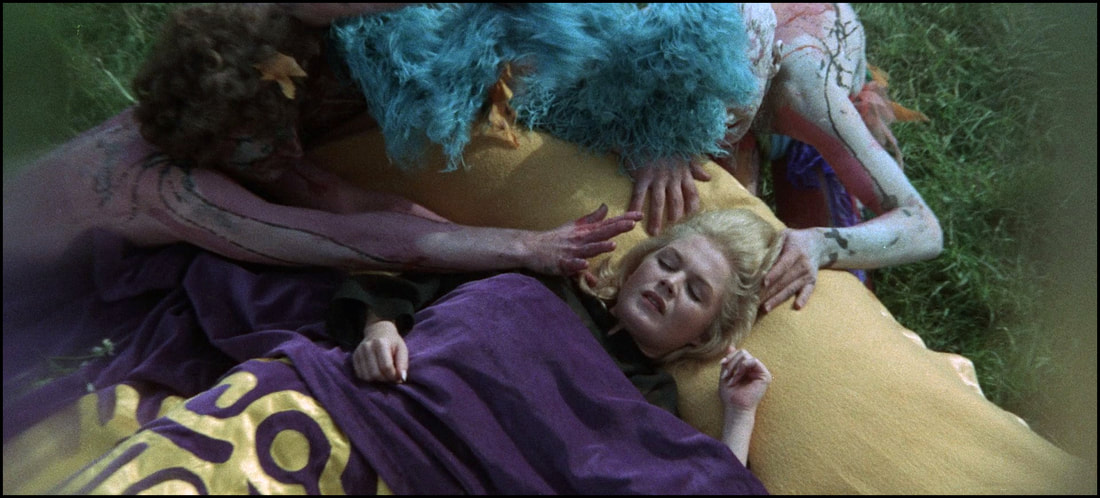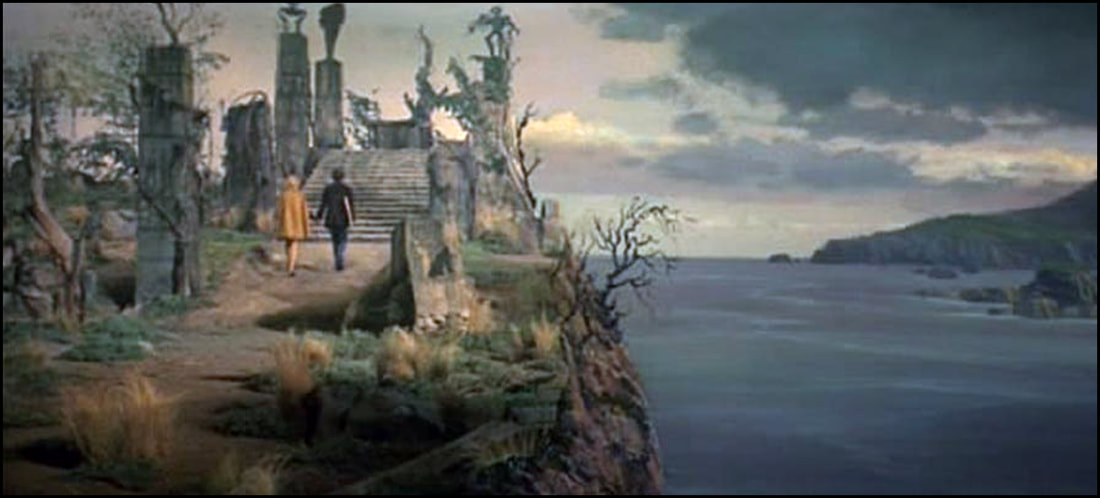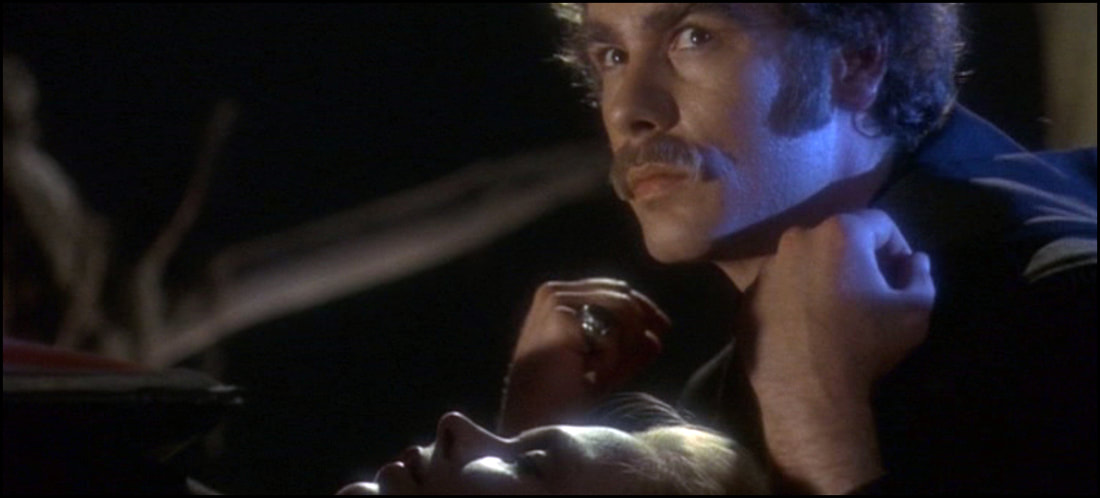What is functionally frightening varies person-to-person. While some audiences find pictures exploring demonic possession to be the zenith of the genre, I’ve also found them exploitive and inadequate, never posing enough answers for my inquiring mind. Slasher pictures? Well, they have an interesting vicariousness to them, but their stories tend to simplify the psychology to the point of absurdity, and I’m not all that moved by the effort. Ghosts? I don’t believe in them, so buying into these particular tales is an uphill battle right out of the gate. See what I mean? Because the requirements of what each of us looks for in a great picture varies, storytellers end up pushing their yarn into particular tracks, hoping that those most interested in this particular type of Horror finds it.
Consequently, the filmed versions of H.P. Lovecraft’s works have been a mixed bag for me as a reviewer.
Like so many, I know his name best for the great and gory Re-Animator (1985) and From Beyond (1986), both which came to bold cinematic life from the work of the late director Stuart Gordon. Simply put, Gordon’s style had a way of interpreting Lovecraft’s occasionally dizzying worldview in a way that viewers could relate to, giving it perhaps a prettier package than such mythology is owed. (God bless the 1980’s, am I right?) It may not have always been – say – intellectual, but it was as much fun the way a good movie should be as it was truly scary. Lovecraft had his own shortcomings – as an author and as a man – and he leaves behind a legacy that Gordon effectively mined for success in the home video era.
1970’s The Dunwich Horror, by comparison, is an incessantly tame, but don’t mistake it’s lack of chutzpah as laziness. The film occasionally hits some interesting chords for smart viewers, but – much like its central character suffers from the constant drugging – there’s an undercurrent of lethargy anchoring it in the slow lane … and that’s ultimately what keeps this attempt from being truly as groundbreaking as it could’ve been.
(NOTE: The following review will contain minor spoilers necessary solely for the discussion of plot and/or characters. If you’re the type of reader who prefers a review entirely spoiler-free, then I’d encourage you to skip down to the last few paragraphs for the final assessment. If, however, you’re accepting of a few modest hints at ‘things to come,’ then read on …)
“Wilbur Whateley travels to the Arkham Miskatonic University to borrow the legendary Necronomicon. But, little does anyone know, Whateley isn’t quite human …”
Honestly, I’ve read enough Lovecraft to know that I probably wouldn’t enjoy reading all that much more of it. I offer that not so much as a reflection on the quality as I do a general statement on his particular style: it’s just not something that moves me as a reader. While imaginative and understandably pioneering in its own way, it just doesn’t connect with me on any level, so I’ll leave that discussion to others.
Still, screenwriters Curtis Hanson, Henry Rosenbaum, and Ronald Silkosky (yes, this film went through several hands before finding life) did a pretty estimable job at taking a unfilmable work such as The Dunwich Horror and turning it into something for mass consumption. Director Daniel Haller also packed his feature with enough visual flourish to keep some of the tale’s more esoteric moments both convincing and compelling, so much so that the folks behind the Avoriaz Fantastic Film Festival nominated the picture for its 1973 Grand Prize. Though the film didn’t win, I think the nomination alone is justified and perhaps speaks to why audiences might want to spend 90 minutes getting comfortable with this release.
From what I’ve read, headliner Sandra Dee initially signed aboard the project as she saw its subject matter as being substantially different from anything she’d done before that it would rejuvenate her career. For those unaware, Dee’s workload to this point had involved playing somewhat virginal young ladies; her performances in the Gidget film series as well as a few other pictures had made her the heartthrob of young men and boys across America, and the actress wanted her return to the silver screen after a three year hiatus to demonstrate that she had outgrown such fare and was ready for a new direction. She saw Dunwich’s ‘Nancy Wagner’ as up to that task.
In that respect, her performance in the picture is merely ‘good enough.’ My reservations with it aren’t centered on Dee’s talent – which is never in doubt – but rather the problems with the script.
In fact, I’ve read that Dee refused to do any nudity in Dunwich. (In all seriousness, there isn’t much in there, certainly not all that much assigned to the character.) The sequences of Wagner appearing beneath a thin, belted black veil on the cliffside altar were captured with a body double, and – as I stated – this occupies a great amount of the film. I don’t know who producers ultimately cast to fill out those seminal moments in their project, but I can tell you the woman’s left butt cheek certainly leaves its own mark in film history. It conveys a level of eroticism usually reserved for full frontal! Frankly, I’ve never seen better acting from a hip.
Alas, Dunwich ends up being one of Stockwell’s more memorable efforts.
In the guise of Whateley, the actor is in full command of the screen at every opportunity. While dressed as a somewhat meek, bookish man, Stockwell displays a latent confidence in his eyes and posture that speaks to his secret agenda. He plays the small town outsider with a hidden charisma, showing that he’s fully committed to carrying out his affairs no matter the costs to the few around him. There’s almost a spiritual lyricism to his movements – when he’s handling the knife at his grandfather’s grave or mixing potions on the devilish hillside platform. Perhaps Dunwich’s best physically telling moment is when he takes the Necronomicon from which he’s casting his final spell and rests it ever-so-gently between Wagner’s thighs … right in the crotch. It’s a quick sequence – one most viewers might miss – but it’s the kind of visual subversiveness film aficionados like me will be debating the meaning of even on our deathbed.
Had there been more of this – more of these dark, vivid yet provocative touches – then Dunwich may’ve made for a tastier concoction.
Haller packs the film with some interesting tactics, fleshing out an interesting ‘point-of-view’ of the central creature as it terrorizes the countryside once unleashed from the attic, some of which gets rendered in monochrome effects trickery. There’s even the suggestion of a monstrous rape when Wagner’s coworker Elizabeth Hamilton (the comely Donna Baccala) tries to uncover just what secrets are hiding in the Whateley mansion, only to fall victim herself to just whatever it is was hiding in the house. But too much of it gets wasted in the slow, plodding delivery, leaving too much of the experience feeling like we were searching for a different villain when what mattered most were the two we already had.
- Well, let me first state that – as always – Arrow should be commended for producing some of the best collections around (I seriously have a ton of respect for their packaging) … but – ahem – the disc boasts an audio commentary from English author Guy Adams and author A.K. Benedict that I found quite distracting. Rarely do the two actually provided substantive information about the film, instead choosing to engage in some banter only semi-related to it. While it was occasionally clever and/or funny, it just seemed like a real miss, never quite giving the flick the respect much less consideration it was owed.
- Instead, I’d recommend viewers spend time with The Door Into Dunwich, a 2+ hour conversation about the film and Lovecraft in general between comic book artist Stephen R. Bissette and novelist Stephen Laws. It’s a vastly more respectful dissection of the feature and like-minded pictures as well as the cast and crew and other Lovecraftian material. Though a bit dry in a few spots (lots of facts and figures can bog down the mind), these two clearly know their stuff and do a much better job in conveying why the flick deserves a bit of consideration, even though today’s audiences might find it a bit dated.
- Furthermore, the disc includes a 16+ minute essay by Science Fiction and Fantasy author Ruthanna Emrys that is far more respectful and interesting than the commentary, as well. While it doesn’t focus centrally on Dunwich, it’s still more on-track and incisive about Lovecraft than the two comedians manage to deliver.
- Also, there’s an overlong examination of Les Baxter’s score for the film done by David Huckvale (of BBC Radio). While quite good (the report, not so much the score, which I found a bit curious, at best), I think it could’ve been edited to be much shorter, mainly because I didn’t find the film’s music to be nearly as impactful as it could’ve been. Diff’rent folks, Diff’rent strokes …
- Lastly, the disc includes the obligatory theatrical trailer and image gallery.
- P.S.: online reportage also states that the Arrow release includes a collector’s booklet including two different essays. I was only provided an industry screening copy – sans the actual packaging – so I unfortunately can’t comment on the quality of those materials, having not seen them. (Argh!)
Mildly recommended.
In some ways, I was surprised I didn’t enjoy The Dunwich Horror (1970) more. It had everything I typically look for in a quality supernatural film – solid cast, good script, strong villain, respectful production, etc. – but for reasons I can’t quite fathom it just failed to fully resonate. The pacing feels entirely off in a few places, and scenes stretch out much longer than they need to be. I’m left wondering if the flick came in a bit short and/or studio shenanigans asked for reshoots and/or pickups to get the picture in the shape the corporate suits required. Whatever the truth may be, the end result is that its narrative bloat detracts from what good choices director Haller made, and I’ve no doubt a leaner cut may very well have improved the whole affair.
In the interests of fairness, I’m pleased to disclose that the fine folks at Arrow Films provided me with a complimentary Blu-ray of The Dunwich Horror (1970) by request for the expressed purposes of completing this review; and their contribution to me in no way, shape, or form influenced my opinion of it.
-- EZ





 RSS Feed
RSS Feed